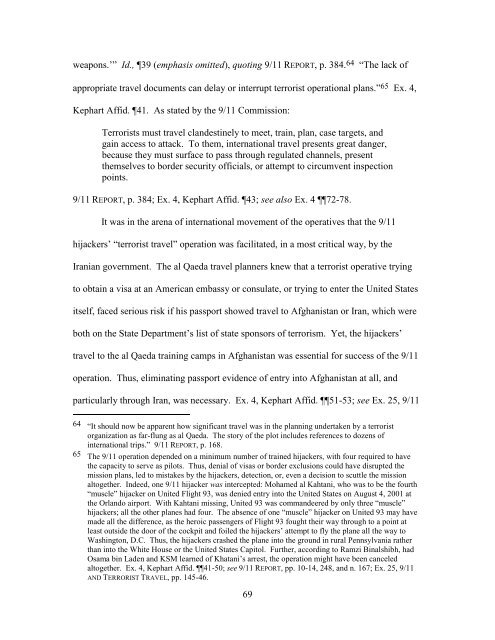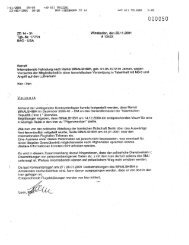Create successful ePaper yourself
Turn your PDF publications into a flip-book with our unique Google optimized e-Paper software.
weapons.‘‖ Id., 39 (emphasis omitted), quoting 9/11 REPORT, p. 384. 64 ―The lack ofappropriate travel documents can delay or interrupt terrorist operational plans.‖ 65 Ex. 4,Kephart Affid. 41. As stated by the 9/11 Commission:Terrorists must travel clandestinely to meet, train, plan, case targets, andgain access to attack. To them, international travel presents great danger,because they must surface to pass through regulated channels, presentthemselves to border security officials, or attempt to circumvent inspectionpoints.9/11 REPORT, p. 384; Ex. 4, Kephart Affid. 43; see also Ex. 4 72-78.It was in the arena of international movement of the operatives that the 9/11hijackers‘ ―terrorist travel‖ operation was facilitated, in a most critical way, by the<strong>Iran</strong>ian government. The al Qaeda travel planners knew that a terrorist operative tryingto obtain a visa at an American embassy or consulate, or trying to enter the United Statesitself, faced serious risk if his passport showed travel to Afghanistan or <strong>Iran</strong>, which wereboth on the State Department‘s list of state sponsors of terrorism. Yet, the hijackers‘travel to the al Qaeda training camps in Afghanistan was essential for success of the 9/11operation. Thus, eliminating passport evidence of entry into Afghanistan at all, andparticularly through <strong>Iran</strong>, was necessary. Ex. 4, Kephart Affid. 51-53; see Ex. 25, 9/1164 ―It should now be apparent how significant travel was in the planning undertaken by a terroristorganization as far-flung as al Qaeda. The story of the plot includes references to dozens ofinternational trips.‖ 9/11 REPORT, p. 168.65 The 9/11 operation depended on a minimum number of trained hijackers, with four required to havethe capacity to serve as pilots. Thus, denial of visas or border exclusions could have disrupted themission plans, led to mistakes by the hijackers, detection, or, even a decision to scuttle the missionaltogether. Indeed, one 9/11 hijacker was intercepted: Mohamed al Kahtani, who was to be the fourth―muscle‖ hijacker on United Flight 93, was denied entry into the United States on August 4, 2001 atthe Orlando airport. With Kahtani missing, United 93 was commandeered by only three ―muscle‖hijackers; all the other planes had four. The absence of one ―muscle‖ hijacker on United 93 may havemade all the difference, as the heroic passengers of Flight 93 fought their way through to a point atleast outside the door of the cockpit and foiled the hijackers‘ attempt to fly the plane all the way toWashington, D.C. Thus, the hijackers crashed the plane into the ground in rural Pennsylvania ratherthan into the White House or the United States Capitol. Further, according to Ramzi Binalshibh, hadOsama bin Laden and KSM learned of Khatani‘s arrest, the operation might have been canceledaltogether. Ex. 4, Kephart Affid. 41-50; see 9/11 REPORT, pp. 10-14, 248, and n. 167; Ex. 25, 9/11AND TERRORIST TRAVEL, pp. 145-46.69









